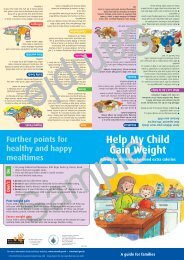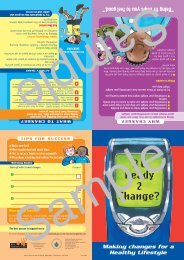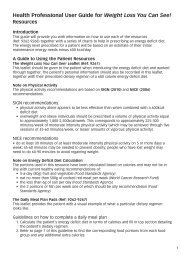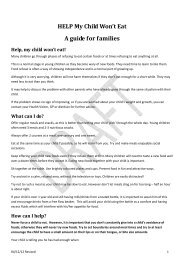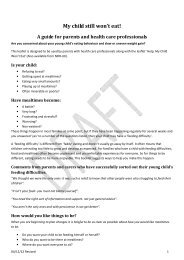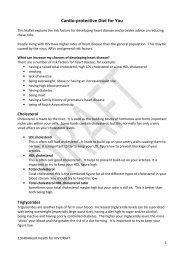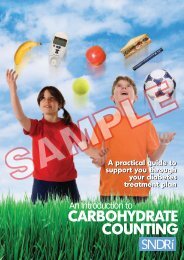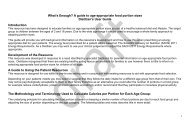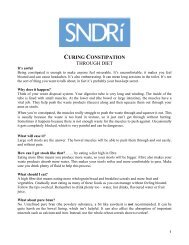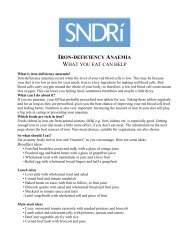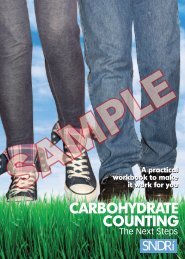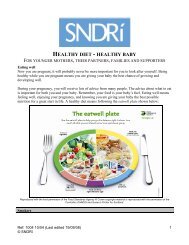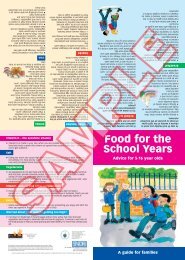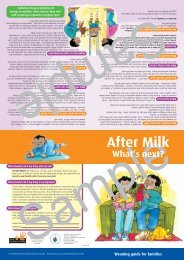DIABETES â HEALTHIER EATING - NDR-UK
DIABETES â HEALTHIER EATING - NDR-UK
DIABETES â HEALTHIER EATING - NDR-UK
You also want an ePaper? Increase the reach of your titles
YUMPU automatically turns print PDFs into web optimized ePapers that Google loves.
<strong>DIABETES</strong> – <strong>HEALTHIER</strong> <strong>EATING</strong><br />
Having diabetes means that your body is less able to control the amount of glucose (sugar) in your<br />
blood.<br />
Food choices and eating habits are important in helping you to control your diabetes. You do not need<br />
to follow a special diet but you may need to make some changes to your current eating habits. You will<br />
be able to enjoy a healthy balanced diet, which is suitable for all the family.<br />
The eatwell plate below shows the food groups which makes up the correct balance of foods for a<br />
healthy diet:<br />
Reproduced with the kind permission of the Food Standards Agency © Crown copyright material is reproduced with the permission of the<br />
Controller of HMSO and Queen's Printer for Scotland.<br />
This leaflet will give you some starter information about healthy eating and diabetes. However, your<br />
doctor should refer you to a local State Registered Dietitian, who will advise you on your personal food<br />
choices.<br />
© S<strong>NDR</strong>í 1
Practical guidelines for healthier eating<br />
Eat regular meals<br />
• Have 3 meals a day i.e. breakfast, lunch and evening meal - one of which could be a snack meal.<br />
• Starchy foods such as breakfast cereals, porridge, bread, potatoes, rice, pasta or chapattis should<br />
be eaten at each meal.<br />
• Wholegrain, wholemeal or high fibre varieties of these foods are healthier options.<br />
• Include daily a variety of fruit and vegetables.<br />
Eat less sugar and sugary foods<br />
• Foods and drinks which are high in sugar can make your blood glucose levels rise too quickly.<br />
If you eat these high sugar foods and drinks:<br />
Sugar, glucose, glucose syrup, dextrose, sucrose<br />
Squashes and fizzy drinks e.g. Ribena, Lucozade,<br />
Coca Cola<br />
Sweets e.g. chocolate, toffee, fudge, mints<br />
Sweet cakes, pastries, chocolate and cream filled<br />
biscuits<br />
Sugar-coated or honey coated breakfast cereals e.g.<br />
Frosties, Sugar Puffs, Crunchy Nut Cornflakes<br />
Sweet puddings e.g. crumble, tarts, tinned fruit in<br />
syrup, jelly, mousse,<br />
Marmalade, jam, honey, syrup, lemon curd<br />
Change to low sugar/sugar free alternatives<br />
Artificial sweeteners e.g. Canderel, Sweetex,<br />
Splenda, Hermesetas, saccharin<br />
Water, soda water, diet and low calorie, sugar<br />
free squashes and fizzy drinks<br />
Fruit<br />
Plain biscuit, crispbreads, crackers, a small<br />
scone or pancake<br />
Sugar free mints<br />
Unsweetened porridge and muesli, Weetabix,<br />
Branflakes, Cornflakes, Rice Krispies<br />
Fresh or dried fruit, diet yoghurt, sugar-free<br />
jelly, tinned fruit in natural juice<br />
Reduced sugar marmalade and jam<br />
*Ordinary jams and marmalades may be used if spread thinly.<br />
There is no need to buy special ‘diabetic’ foods and drinks. These are often more expensive, can have a laxative effect, and<br />
will not help you to lose weight.<br />
Try to have 5 servings of fruit and vegetables a day - this should include at least two portions<br />
of vegetables/salad<br />
• Fresh, frozen or tinned vegetables are fine e.g. carrots, broccoli, tomatoes, salad vegetables.<br />
• All fruit is good for you and can be taken as a between-meal snack or as a dessert. Include fresh<br />
fruit such as apples, oranges, bananas, and grapes, fruit tinned in natural juice, small handful of<br />
dried fruit or small glass of unsweetened fruit juice.<br />
Cut down on fried and fatty foods<br />
Too much fat is linked to the development of heart disease and strokes; cutting down on fatty foods<br />
will also help you to lose weight.<br />
• Use semi-skimmed or skimmed milk and use lower fat varieties of cheese.<br />
• Use less butter. Choose a margarine or low fat spread instead, and spread thinly.<br />
• Eat fewer crisps, chips, biscuits, cream, pastryproducts e.g. pies, sausage rolls, and "takeaway"<br />
meals.<br />
• Grill, poach, boil, steam, microwave or oven bake food instead of frying<br />
© S<strong>NDR</strong>í 2
Use less salt<br />
• Use only a little salt in cooking and try not to add more to your meal.<br />
Alcohol<br />
• Alcohol may be included in moderation - choose ordinary beers, spirits and dry wines. (Please ask<br />
your doctor, nurse or dietitian for further advice on recommended amounts.)<br />
• Try to have at least 2 alcohol-free days each week.<br />
• Low alcohol lagers, sweet wines, sherry or liqueurs are not recommended.<br />
Try to become more active; make regular activity part of your lifestyle<br />
e.g. a daily walk.<br />
If you are overweight, losing weight can help to control your diabetes.<br />
Sample Meal Plan<br />
Breakfast<br />
Small glass of unsweetened fruit juice or fresh fruit<br />
Choice of cereal e.g. porridge, no added sugar muesli, Weetabix, Branflakes with semi-skimmed milk<br />
and / or<br />
Wholegrain, wholemeal or granary bread thinly spread with low fat margarine<br />
Snack Meal<br />
Soup e.g. vegetable broth, lentil, pea and ham with wholegrain bread or roll<br />
or<br />
Roll or sandwich with suitable fillings e.g. tuna, lean cooked meat, thinly sliced cheese, and salad. Use<br />
wholegrain, wholemeal or granary bread.<br />
Yoghurt or fromage frais – choose varieties which are low in both sugar and low fat<br />
and/or<br />
fresh fruit<br />
Main Meal<br />
Choice of pasta or boiled rice or boiled / baked potato<br />
Serve with lean meat, poultry, eggs, pulses or fish<br />
Include a variety of vegetables or salad<br />
Tinned fruit in natural juice or fresh fruit<br />
and /or<br />
sugar free dessert e.g. yoghurt, jelly<br />
Snacks (if desired)<br />
Fresh fruit or toast or plain biscuit<br />
Plain crackers or crispbread<br />
Suitable drinks<br />
Water, sugar-free diluting juice, diet fizzy drinks, tea and coffee<br />
This information has been produced for S<strong>NDR</strong>í by Registered Dietitians and other relevant health professionals. At the time of publication the information<br />
contained within the leaflet was, to the best of our knowledge, correct and up-to-date. Always consult a suitably qualified dietitian and/or your GP on<br />
health problems. S<strong>NDR</strong>í cannot be held responsible for how clients/patients interpret and use the information within this resource.<br />
© S<strong>NDR</strong>í 3



